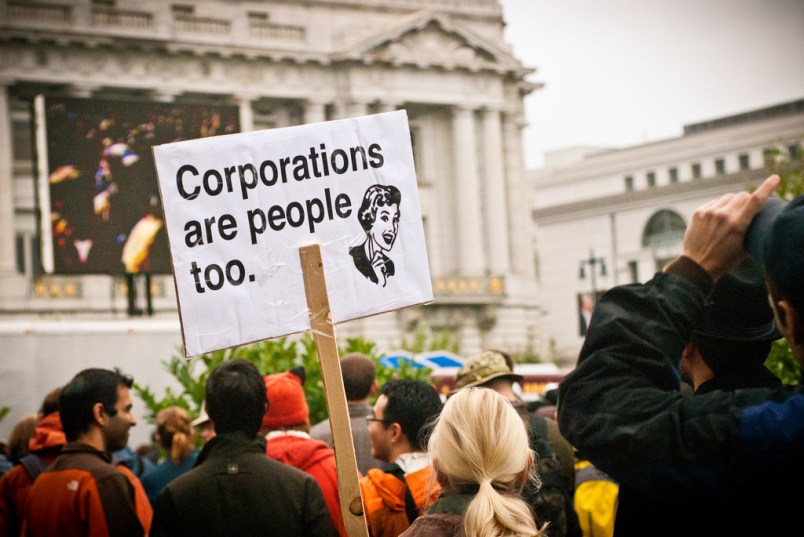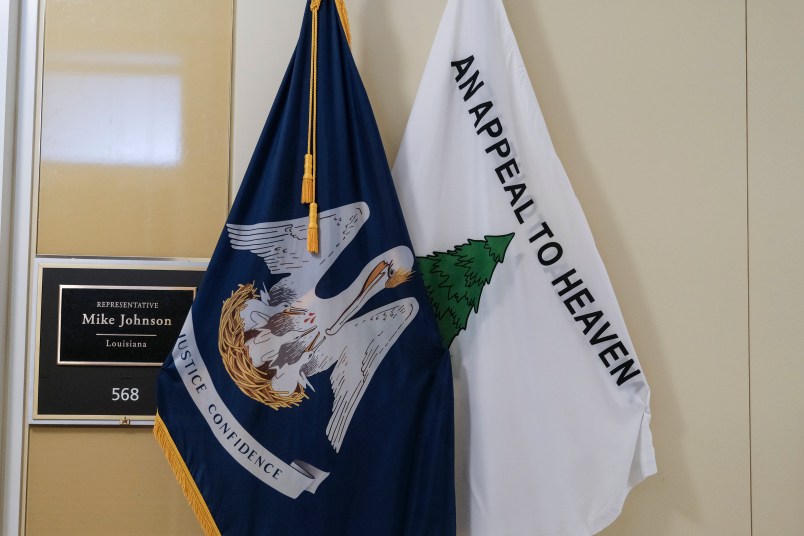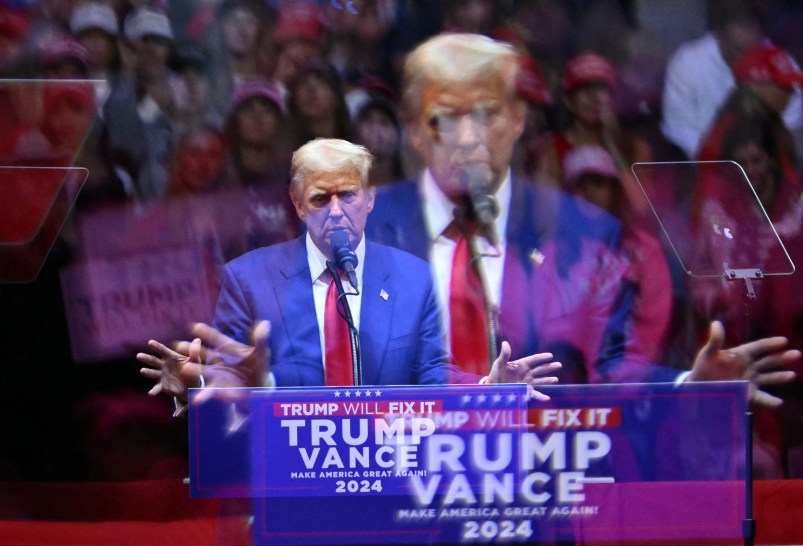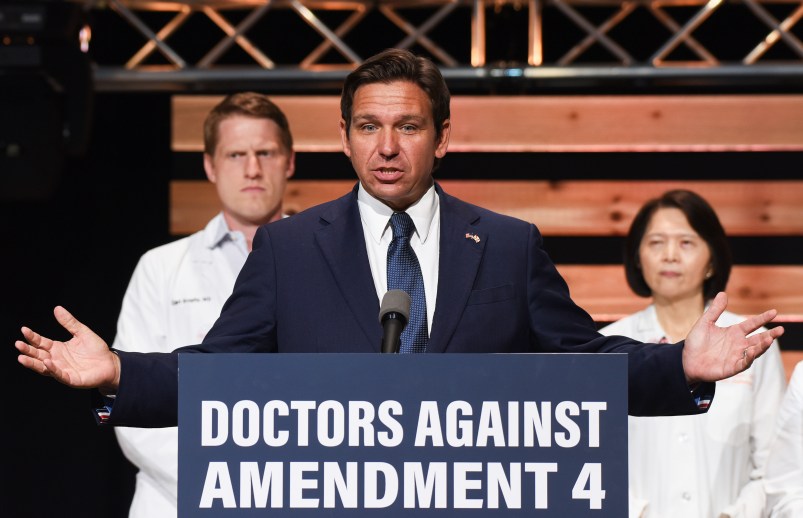The “fix” is in on Indiana’s Religious Freedom Restoration Act. The religious right has somewhat retreated, at least for the time being. The strange alliance of corporate America and LGBT civil rights activists has triumphed—or at least the corporations have.
Governor Mike Pence has accepted an amendment clarifying that “this law does not give businesses a right to deny service to anyone.” But if the law is not about discrimination, what’s it about? We need to look behind the religious intolerance to see that the governor, legislators and businesses were willing to amend the original RFRA because the proposal didn’t change the original text of the law that extends and secures the corporate civil rights recognized in the Hobby Lobby decision in 2014.
The new RFRAs are part of the new Corporate Civil Rights Movement.
In March, we celebrated the 50th anniversary of the hard-won victory of the Voting Rights Act and remembered the bloodshed on the bridge out of Selma that secured the legal civil rights of all Americans. Meanwhile, a much less spectacular civil rights march is quietly afoot today. Expressions of the new desires for freedom are heard not in the rousing speeches of charismatic African-American orators nor the soul-stirring songs of civil rights activists, but in the dull legalese of corporate lawyers and the tedious yet tendentious decisions by activist judges on the U.S. Supreme Court.
The Roberts Court is marching on the rights of real people, steadily extending to corporations our civil and political rights, even as it chips away at the civil rights of women and minorities.
The Corporate Civil Rights Movement took a big step forward five years ago with the Citizens United decision. The Supreme Court expanded the rights of corporations to participate in elections by giving them unfettered free speech, in the form of unlimited financial donations to Political Action Committees and other “dark money” organizations.
Then, just two years ago, the Supreme Court rescinded some of the civil rights guarantees for people secured in the 1965 Voting Rights Act. With its decision in Shelby County v. Holder, which took the enforcement teeth out of the law, the court effectively reversed the civil rights march, walking back federal protections against voter intimidation and discrimination that people died to attain. This prompted U. W. Clemon, the first African-American Federal Judge in Alabama, to declare that we have “the worst Supreme Court in terms of civil rights” since the Dred Scott decision in 1857, which concluded that slaves are not legal persons.
Clemon is clearly not looking at the court through the eyes of corporations. They, too, shall overcome.
The expansion of the civil rights of corporations might seem to have little to do with the extension (and recent contraction) of civil rights for racial minorities. In fact, the two have a long, complicated history in the United States.
The first steps on the march for Corporate Civil Rights were taken shortly after the Civil War. The Reconstruction amendments to the U.S. Constitution (in particular the 14th and 15th Amendments) granted citizenship, voting rights and legal protections to former slaves. Those amendments offered a late remedy to the original constitutional sin that counted slaves as three-fifths of a person. But turning ex-slaves into legal persons opened the door for the emancipation of the corporation as a modern legal person in its own right.
We often talk of the women’s liberation and gay rights movements as building on the success of the African-American Civil Rights Movement, but corporations (both now and after the Civil War) may be the biggest beneficiaries of abolition and the civil rights struggle—as the successful pushback against the Indiana RFRA will ultimately prove. Indeed, as legal historians Richard Stiller, Carl Mayer, Austin Allen and others have shown, during the 1880s and 1890s, corporations managed to take more advantage of the new constitutional protections than did black Americans. In other words, corporations claimed the rights of freed slaves, often to the express disadvantage of the freed men.
In retrospect, the Reconstruction amendments may have represented one small step for men, but one giant leap for corporations. And today, as corporate legal scholar John C. Coates IV has written, corporations “have increasingly displaced individuals as direct beneficiaries of First Amendment rights.”
Corporations were originally created to promote the common good, leveraging the power of collective monies and action to undertake large public works projects that could not be accomplished by individuals acting alone or by governments with public funds. This is how the U.S. built much of its transportation, utility, educational and financial infrastructure. Corporations can usefully multiply the power of individuals.
However, when the Roberts Court freed corporations to participate in our election process, it also effectively diminished the political power and voice of individuals, especially of women and minorities.
If corporate boards are any indication, most companies in the U.S. are largely made up of white men—a higher proportion than white men in America generally. According to the Alliance for Board Diversity, between 2010 and 2012, white men made up more than 73 percent of the boards of directors of Fortune 500 companies, white women made up little more than 13 percent, while the remaining 13.3 percent were men and women of minority populations. An infinitesimal percentage of all companies are run by a majority of women and minorities.
Today the multiplying power of corporations is being used to multiply the electoral power of a demographically diminishing white male population. On its Corporate Civil Rights March, the activist right wing of the U.S. Supreme Court has disproportionately amplified the voices and influence of white male corporations in our political and legislative processes.
The legal expansion of corporate electoral power and the contraction of minority rights should be seen as part of the same picture, and in light of the long history of corporations expanding their own civil and political rights by exploiting legal provisions intended to guarantee equal rights for racial and other minorities.
The new Corporate Civil Rights Movement doesn’t offer the indelible images of civil disobedience or the inspiring slogans of prior struggles for equality, but it’s a coordinated crusade nonetheless (and should be recognized and contested as such) that exploits the victories of those earlier civil rights movements for its own ends. When our civil rights struggles feel victorious, as the successful pushback against the Indiana RFRA now does), we need also to be wary of the corporate person marching after us to take advantage of our civil liberties.
Lead photo: Victor Gregorio on Flickr Creative Commons
Joseph Slaughter is an associate professor English and Comparative Literature at Columbia University. He is the author of Human Rights, Inc. and is currently working on a book on international human rights law and corporate personhood.










Corporate civil rights are an interesting way to look at it. I question the legitimacy of corporate power, implicit in the calls for triple-bank-shot boycotts to pressure Indiana businesses or Final Four advertisers to lobby the government to change the law. It simply shouldn’t be the government’s job to do the bidding of big business.
Are corporations people?
Number of people incarcerated in the US (2011): 2,266,832
Number of corporations incarcerated in the US: 0
Corporate personhood is a legal fiction: something that everyone knows isn’t true but that is accepted in order to meet some legal requirement. When corporations can be put in prison, then they’ll be people.
Chalk this up as another example of confusion, foremost among businesspeople themselves, between the privileges and preferences that businesspeople demand, with what’s actually good for business. It’s a trick worthy of Penn & Teller, these independent retailers nailing their own coffins from the inside.
Sooner or later, gay couples are going to say to hell with it. It’s just a damn cake and flowers are flowers. Rather than be judged by an independent businessperson who doesn’t want their business, people will just get a generic Wal-Mart cake and be done with it.
You know how anti-gay bigots used to endlessly repeat “no special rights” when trying to deny even the semblance of equality for LGBT persons? I think that argument should actually have force when applied to corporate persons. As long as corporations are potentially immortal, cannot be imprisoned or – in large part – otherwise effectively sanctioned by criminal law, the “civil liberties” they keep demanding do amount to special rights.
I wonder how this would work if any corporation asserting civil liberties had to, say, agree to be limited to the old three score and ten, with its estate subject to the usual taxation upon distribution to any heirs.
Don’t know who originally said it, but “I’ll believe corporations are people when Texas executes one.”